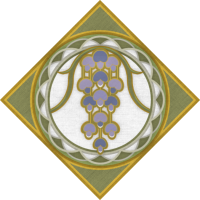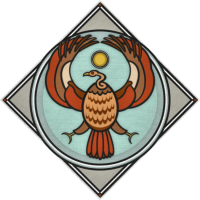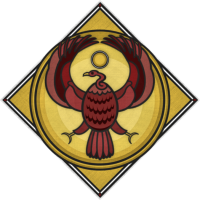“We need horses,” Prince Fingolfin said, and to which the gathered princes of his host agreed. Some heads nodded more vigorously than others, but no one present at his council refuted his statement. The boost to mobility and size against the orcish army had been well-proved by the cavalry victory of the sons of Fëanor before the moon arose. Novices the Noldor still were to warfare, yet the example of Lord Oromë and Nahar had affixed the righteousness of facing Morgoth's pawns from horseback in their minds even before the return to Beleriand's shores and recent history had die-cast it in lead. Aranwë as acting secretary for the council meeting recorded the lack of horses at the top of a priority list, above the need to locate good iron ore and stone to build strong fortifications. Plans to rectify their need remained unwritten.
Only the sons of Fëanor and their followers possessed any horses, for they had transported the animals aboard the stolen Swan-ships. It had proven impossible to herd any creature across the frozen darkness of the ice desert, and the followers of Fingolfin and Finrod had not attempted to do so. Nor had they any horses or other beasts of burden remaining in their possession to attempt to take with them across the Helcaraxë after Fëanor had betrayed the host by taking the fleet and then abandoning them. Fëanor and his followers had loaded all the animals that the Noldor had the foresight to bring in that hurried flight onto the largest of the Swan-ships before he disembarked in secret. "They would have stolen the chickens, had we brought them," Egalmoth said, a joke that Aranwë and Ecthelion often repeated.
To his best friend, Turgon privately confided that his brother Fingon was as wroth at the theft of his beloved steed as to the general betrayal at Losgar. Finrod believed it, for he had taken part in drafting and revising the proposals for possible reconciliation that Fingolfin sent to Maglor after learning of what had transpired before their arrival. At the top of the list of demands was the return of Fingolfin and Fingon’s horses. Finrod's personal missives to his cousins across the lake were short, sympathetic notes that strongly urged Maglor to submit to their uncle and accept these peace terms. Words of disgust and disappointment had been restricted to unsent first drafts. Quick warnings and reminders to ensure nothing unfortunate happened to Fingolfin and Fingon's horses -and relief that they had not been among those lost to Ossë and Uinen's wrathful retaliation- went above the signature.
Turgon’s personal opinion was that food was a more pressing demand, though he conceded to Finrod that plough animals would greatly increase the production of arable land, and thus horses would be a boon.
The Sindar elves of this new mist-laden land did possess horses, though the animals were few and far between because of the onslaught of the army of Morgoth. Herds of thousands had been slaughtered by the orcs, and most of the surviving animals had been rescued by taking them south into the protection of the Girdle or by fleeing east and then south. The horses and other livestock that the Sindar herdsmen had been able to protect and hide from the orcs were therefore all the more precious and guarded.
In any case, the native horses of Beleriand were smaller creatures than the Noldor were accustomed to, almost uniformly of a black or bay coloration, though some had a lighter dun coat, with sporadic stripes and spots, and universally with a long black stripe down the back. Their heads were large and ungraceful, eyes small and dark, and the manes and tails thick and coarse. Prince Fingon disparagingly likened them to donkeys and asses, yet he was first to entreat the Sindar who still owned horses to allow him to examine the surviving animals and worked tirelessly to assist in their care and tend to lingering wounds. Suspicion of the Noldor prince swiftly faded the longer he spent rubbing salves into festering cuts and asking earnest questions about each animal's temperament and history. Fingon would return to camp late for council meetings with mud caked to his knees and hands smelling of unfamiliar stringent healing herbs. His father did not bring attention to his eldest son's absence from the meetings, and Aranwë only bothered to send copies of the council discussions and recordings to Turgon. No one protested Fingon's lack of involvement, because no one truly desired Fingon's political input or logistical insight. Fingon’s interest back in Valinor had heavily skewed towards all forms of equestrian competition, a passion he had shared with Aunt Lalwen, and no one was better at creating an instant rapport with the animals. Unlike gregarious and charismatic Turgon, his older brother Fingon had always very few friends, and those few but close bonds of friendship had mostly been forged in the paddock fields or as friendly rivalries in the equestrian sports.
Angrod’s wife, Edhellos, had bred and raised horses, selling the finest to the various princes, and the renown of her animals and the smoothness of their specialized gaits had been second only to a rival family that pledged loyalty to the eldest of Finwë's sons back when the political split in Tirion began to widen. Of the horses paddocked in the Fëanorian camp, she had personally bred or trained the majority and could detail the names and pedigrees of the remainder. Edhellos would glared across the lake in the direction of those stolen horses, murmuring dark and vicious words too low for any to hear. Then to quell her hate temporarily she would visit the Sindarin herds, though that had the opposite effect of only inflaming her jealousy. “We need horses,” Angrod said to his older brother, “for my marriage depends on it.”
Finrod enlisted Turgon’s help in conferring with the leaders of the Sindar elves in Nevrast about possible purchases of some of the remaining horses. Sheltered in the marshland around the lake in eastern Nevrast, multiple herds of these smaller gray and white horses -ponies, truly- had survived. The horses of Nevrast were too short to be comfortably ridden by the taller Noldor; Turgon in particular looked comical standing next to one- but for pack animals and pulling farming equipment they would more than suffice. And they were more aesthetically pleasing than the other breeds native to Northern Beleriand, if the princes were honest. Edhellos praised their even temperaments, muttering about the princes' obsession with flashy animals. "A high trot and shiny coat will not do us any good, but trying to fight afoot or furrow a field by hand would be worse. And our options are limited." Finrod began to divvy some of the jewelry he had carried across the Helcaraxë to people he trusted, sister-in-law Edhellos and his childhood friends Edrahil and Heledir chief among them, to bargain for horses under the name of King Fingolfin. Turgon had a strong reputation with the leaders in Nevrast, bolstered by Fingon's rapport with the herdsmen, yet the price per head was steep, and only a few of the horses were willing to be parted with.
"And you thought I was foolish for carting those jewels across the ice," Finrod teased as Heledir trotted a string of mares and yearlings through the Cirith Ninniach from Nevrast into Hithlum, the hoof-beats echoing strangely through the narrow passage above the fast-moving stream.
According to a helpful Sindar herdsman named Annael, yes, the natives of Beleriand did have ‘tall horses’. The King of Beleriand, Elu Thingol, was taller than even Prince Turgon, and needed a refined and spirited mount equal to his stature. There was a royal herd of leopard-spotted destriers, horses as strong and swift as any son of Nahar, but they could not be found north of the Ered Wethrin.
Still the existence across Lake Mithrim of the Valinorean horses, tall and strong and more than a few stolen, tormented those that brooded over them and the necessity of horses in the war effort against Morgoth.
This goaded Heledir to make the suggestion one night to Angell and a few other warriors of his acquaintance that they should cross the lake in secret and rustle horses. The idea was eagerly embraced. Secret plans were made, getaway routes carefully examined, Edhellos consulted and inducted into the conspiracy along with her husband, and rope stockpiled. Her desire was more revenge-motivated than the others, but as Heledir teased, it was better to have her with them than attempt without, and this kept Edhellos from just marching across the lake to scream into Caranthir's face. They debated if more than one raid would be necessary, and how many additional riders to guide the herd along the route. Angell began to evaluate the recruits he was training for willingness to engage in subterfuge and ability to ride the purchased Nevrast ponies. Also firmly debated was the merits of stealing the personal mounts of the sons of Fëanor. Edrahil procured more terrain maps and dissuaded Aranwë from scrutinizing the supply requests. Food for the extra horses was set aside. Angrod promised to cover the conspirators in any political fallout with his elder brother or Prince Fingolfin. The return of prizes like Fingon's Arocco would grant them clemency, they decided. To safeguard the reclaimed horses, the plotters considered the necessity of driving the herd across Hithlum deep into the protected territory of Nevrast. The rustled horses could be easily hidden there, yet such a course of action would necessitate Turgon's involvement. As a compromise, Lady Aredhel was inducted into the conspiracy. Of the other would-be thieves, she was the most enthusiastic and ambitious by far.
Thankfully Fingon returned from his daring rescue of Maedhros, facilitating a more genuine probability of reconciliation between the two Noldor camps and the eventual goodwill gesture of the return of several horses and additional livestock. Thus the raid was unnecessary (and plans detailing its existence denied).
"...for from few their horses had increased swiftly, and the grass of Ard-galen was rich and green. Of those horses many of the sires came from Valinor, and they were given to Fingolfin by Maedhros in atonement of his losses, for they had been carried by ship to Losgar." (Chapter 14, The Silmarillion)
Pondering the differences between the native horses of Beleriand and Valinor, I looked to what were the possible original native horses of Europe, giving particular attention to the Tarpan, images of horses found in European cave paintings, and general characteristics of surviving 'primitive' breeds. Most wild horses and those of a recognized 'primitive' type are a dun or mousy gray with a black dorsal stripe and zebra-like leg markings. Ancient European wild horses, being forest dwellers, would have more commonly had coat colors of black or bay to blend in with shadows- something even more necessary for star-dark Beleriand. However, Dalmatian-like leopard spotting was also very common, and this spotted coat, now usually mostly seen in American Appaloosas and Knabstruppers, was more common and prized in the medieval and Baroque periods. And the necessity of a leader on a white horse for visibility would have been even more required in a land with only stars for illumination. Thus Thingol's spotted destriers. Valinorean horses, in contrast, are hot-blooded and high-strung gainted breeds.
Nevrast's ponies around the Lake Linaewen are Camargue horses with the names filled off.
Edhellos, going back to my first Silm fic, has always been a horse breeder and trainer.
Going back to some of the earliest laws recorded among Iron Age Germanic tribes, horse theft was punishable by death and accounted a more serious crime than murder. As per the quote in Chapter 14, the only way to account for the Valinorean horses brought over by the Noldor is via ship. And Fëanor stole the horses for the same reason he embarked on the stolen Swan-ships with only the core of his followers and then torched the ships at Losgar- to deny mobility to others.







